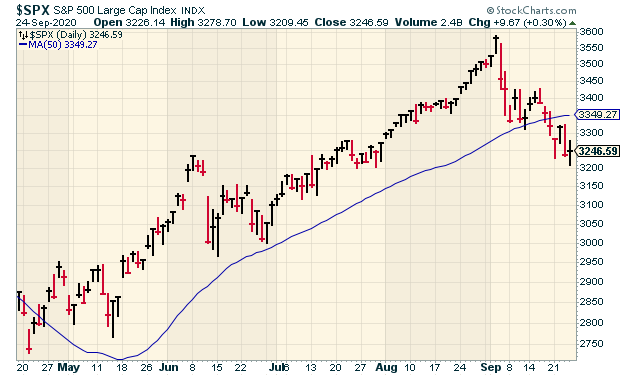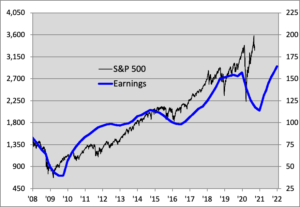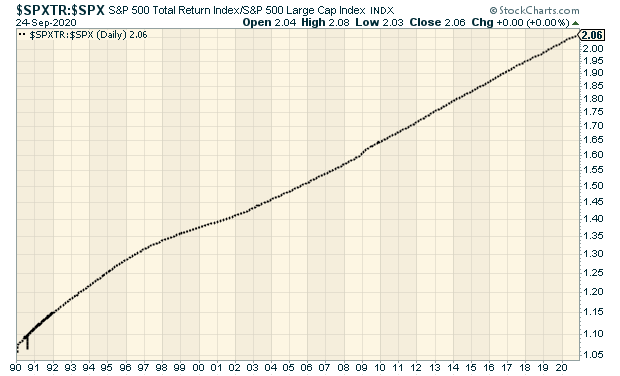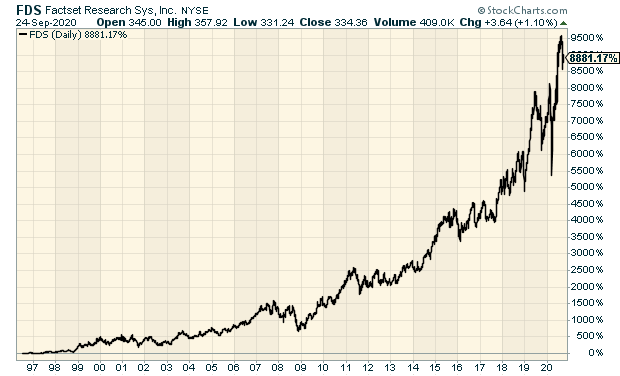CWS Market Review – September 25, 2020
“A lot of people with high IQs are terrible investors because they’ve got terrible temperaments.” – Charlie Munger
In last week’s issue, I mentioned that the S&P 500 was getting close to falling below its 50-day moving average. That’s one of these oddball technical indicators that’s important because everyone else thinks it’s important.
Sure enough, on Friday, the index closed below its 50-DMA for the first time since April, and that gave more confidence to the bears. The S&P 500 continued its slide, and at one point on Thursday, the index was down for the year.

Since the all-time high reached on September 2, the market has lost 9.3%. We’re getting close to a 10% drawdown, which is the traditional definition of a market correction.
We’ve also seen more of the trend I’ve discussed recently, namely value stocks outperforming growth stocks. In fact, the S&P 500 Growth Index is already in correction territory. Since September 2, Growth is down 10.83%, whereas Value is off by 6.91%.
Our Buy List continues to hold up well. This week, we got a blowout earnings report from FactSet. The financial-data company beat Wall Street’s earnings forecast by more than 13%. FDS also offered an upbeat forecast for the year ahead. We now have a 25% YTD gain in FactSet. I’ll have more details in just a bit.
Before I get to that, I want to discuss the upcoming Q3 earnings season. Many companies are still in rough shape. However, for the first time in a long while, earnings estimates are actually increasing.
Third-Quarter Earnings Season Preview
September comes to a close next week, and with it, the third quarter of 2020. By the middle of October, firms will start releasing their Q3 earnings reports. This will be a crucial earnings season for Wall Street and for us.
Here’s a chart showing the S&P 500 in black, with trailing operating earnings in blue. The future part of the earnings line is obviously based on expectations. Trailing earnings are expected to trough in Q4. The two lines are scaled at a ratio of 18 to 1.

The bad news is that this will be another tough earnings season due to the widespread dislocations caused by Covid-19. The good news is that we’ve gradually improved from the dire numbers we saw earlier this year. For Q1, earnings plunged 49% from Q1 of 2019. For Q2, earnings were down 33%.
Now analysts are “only” expecting a decline of 19%. That estimate has actually increased somewhat in recent weeks. At the middle of the year, Wall Street had been expecting Q3 earnings of $30.89 per share for the S&P 500 (that’s the index-adjusted number). Now the estimate is up to $32.05 per share. (Every point in the S&P 500 is worth around $8.27 billion.)
Earnings are expected to fall another 9% for Q4. After that, earnings are expecting to snap back briskly in 2021. That’s why the price/earnings ratio, based on trailing earnings, appears to be stretched. That’s a glitch of using the P/E ratio: earnings look backward but prices look forward.
For all of this year, earnings are expected to be $113.84 per share. By today’s price, that gives the S&P 500 a lofty P/E ratio of 29. However, Wall Street expects full-year 2021 earnings of $164.04 per share. That assumes earnings growth of 45% for next year. Going by that figure, that gives the S&P 500 a forward P/E ratio of 20.
Here’s the expected earnings growth rate for the 11 sectors that comprise the S&P 500:
Healthcare 23.81%
Tech 9.77%
Utilities -1.19%
Consumer Staples -1.68%
Communication -9.95%
Materials -12.56%
Financials -34.55%
Consumer Discretionary -37.20%
Real Estate -50.29%
Industrials -60.10%
Energy -108.27%
Why Dividends Matter
In recent issues, I’ve discussed what the Federal Reserve’s new willingness to tolerate some inflation means for us. My view is that this is good for stocks with attractive dividend yields.
I often think investors don’t fully appreciate the importance of dividends. I recently posted what I called a very “underrated chart” to Twitter. This is the S&P 500 Total Return Index divided by the S&P 500.

Some of the responders weren’t terribly impressed. To generalize, they said, “so what, it’s a line growing at 2%. Big deal.”
But in my view, it’s a very big deal, and it underscores the importance of dividends.
Allow me to explain. First, note how stable the line is and how it rises consistently. As an investor, that’s nice to see.
Technically, the chart shows us the return from dividends for investing in the S&P 500 since the beginning of 1990. It’s not just the dividend yield. It’s the return from dividends. That means it’s the dividend yield, plus the growth provided by dividends. That’s a key factor.
Think of it this way. Imagine a stock with a 1% dividend yield. For the next several years, the stock and the dividend both grow by 15%. What’s the result? The dividend yield will stay at 1%, but you’ve actually made a ton of money from those dividends.
There’s also the multiplier effect. Over the last 30 years, the return from dividends has been 91.58%. But getting dividends from the S&P 500 hasn’t added 91% to your total return. Not even close.
Instead, it turns an 835% gain into a 1,693% gain. It adds hundreds of percentage points to your totals—and that extra amount balloons higher each year. Dividends are small and easy to overlook, but they make a big difference.
On our Buy List, some of the higher-yielding stocks include AFLAC (AFL), Eagle Bancorp (EGBN) and Hershey (HSY). Now let’s look at our most recent Buy List earnings report.
FactSet’s Blow-Out Earnings Report
We had one Buy List earnings report this week, which was from FactSet (FDS). On Thursday, FDS reported very strong earnings of $2.88 per share. That was well above Wall Street’s forecast of $2.54 per share.
First, some background. This was for the fourth quarter of FactSet’s fiscal year, which ended in August. At the time of the last earnings report, the company raised its full-year earnings range to between $10.40 and $10.60 per share. That was an increase of 55 cents per share to both ends of the range. Since FactSet had already made $7.99 per share through the first three quarters, that implied a Q4 range of $2.41 to $2.61 per share.
“We executed well on our second-half pipeline to end our fiscal year in a strong position,” said Phil Snow, FactSet CEO. “I am proud of our team’s performance and remain confident in our investment plan. Our programs in content and technology are expanding the universe of knowledge our clients trust and meeting demand for the workforce of the future.”
For the quarter, FactSet’s organic revenue grew by 4.9% to $383.4 million. A key stat for the company is its Annual Subscription Value, or ASV. At the end of the quarter, their ASV stood at $1.56 billion. The organic growth rate was 5.3%. The annual retention rate is 95%.
This was FactSet’s 39th year in a row of revenue growth, and it looks like they’ll see #40. Client count is up to 5,875, and user count reached 133,051. The company now has 10,484 employees. That’s an increase of 8.3% in the last year.
For the year, FactSet’s earnings rose by 8.7% to $10.87 per share. This is the 24th year in a row that FactSet has grown its earnings.
During Q4, FactSet bought back 81,948 shares for $28.6 million. That’s an average price of $349.25 per share. In March, the company approved an increase to its share-repurchase program of $220 million. There’s now $259 million available to buy more shares.
Now let’s look at guidance. For the new fiscal year, FactSet expects earnings between $10.75 and $11.15 per share. Wall Street had been expecting $10.84 per share. The company sees operating margin ranging between 32% and 33%. That’s very good.
This is an outstanding report. Shares of FDS jumped as much as 8% on Thursday before giving back a lot of that gain. FactSet remains a very good buy up to $360 per share. In 24 years, the stock has returned 8,881%.

Our next earnings report will be from RPM International (RPM) on October 7. I’ll preview that report in next week’s issue. After that, we won’t get any earnings reports until about October 20, during the Q3 earnings season.
That’s all for now. With the end of the month, we’ll get some important turn-of-the-month economic reports next week. On Wednesday, ADP will release its payroll report. We’ll also get another revision to Q2 GDP. On Thursday, the ISM Manufacturing report comes out, along with another initial-jobless-claims report. Then on Friday, the big September jobs report comes out. Be sure to keep checking the blog for daily updates. I’ll have more market analysis for you in the next issue of CWS Market Review!
– Eddy
P.S. Our ETF, the AdvisorShares Focused Equity ETF (CWS), just turned four years old. The ETF is a cheap-and-easy way to invest in our Buy List. To buy one share of each of the stocks on the Buy List would cost you over $3,700, but the ETF lets you own all 25 in a convenient package. For more info, check out our website.
Posted by Eddy Elfenbein on September 25th, 2020 at 7:08 am
The information in this blog post represents my own opinions and does not contain a recommendation for any particular security or investment. I or my affiliates may hold positions or other interests in securities mentioned in the Blog, please see my Disclaimer page for my full disclaimer.
-
-
Archives
- April 2025
- March 2025
- February 2025
- January 2025
- December 2024
- November 2024
- October 2024
- September 2024
- August 2024
- July 2024
- June 2024
- May 2024
- April 2024
- March 2024
- February 2024
- January 2024
- December 2023
- November 2023
- October 2023
- September 2023
- August 2023
- July 2023
- June 2023
- May 2023
- April 2023
- March 2023
- February 2023
- January 2023
- December 2022
- November 2022
- October 2022
- September 2022
- August 2022
- July 2022
- June 2022
- May 2022
- April 2022
- March 2022
- February 2022
- January 2022
- December 2021
- November 2021
- October 2021
- September 2021
- August 2021
- July 2021
- June 2021
- May 2021
- April 2021
- March 2021
- February 2021
- January 2021
- December 2020
- November 2020
- October 2020
- September 2020
- August 2020
- July 2020
- June 2020
- May 2020
- April 2020
- March 2020
- February 2020
- January 2020
- December 2019
- November 2019
- October 2019
- September 2019
- August 2019
- July 2019
- June 2019
- May 2019
- April 2019
- March 2019
- February 2019
- January 2019
- December 2018
- November 2018
- October 2018
- September 2018
- August 2018
- July 2018
- June 2018
- May 2018
- April 2018
- March 2018
- February 2018
- January 2018
- December 2017
- November 2017
- October 2017
- September 2017
- August 2017
- July 2017
- June 2017
- May 2017
- April 2017
- March 2017
- February 2017
- January 2017
- December 2016
- November 2016
- October 2016
- September 2016
- August 2016
- July 2016
- June 2016
- May 2016
- April 2016
- March 2016
- February 2016
- January 2016
- December 2015
- November 2015
- October 2015
- September 2015
- August 2015
- July 2015
- June 2015
- May 2015
- April 2015
- March 2015
- February 2015
- January 2015
- December 2014
- November 2014
- October 2014
- September 2014
- August 2014
- July 2014
- June 2014
- May 2014
- April 2014
- March 2014
- February 2014
- January 2014
- December 2013
- November 2013
- October 2013
- September 2013
- August 2013
- July 2013
- June 2013
- May 2013
- April 2013
- March 2013
- February 2013
- January 2013
- December 2012
- November 2012
- October 2012
- September 2012
- August 2012
- July 2012
- June 2012
- May 2012
- April 2012
- March 2012
- February 2012
- January 2012
- December 2011
- November 2011
- October 2011
- September 2011
- August 2011
- July 2011
- June 2011
- May 2011
- April 2011
- March 2011
- February 2011
- January 2011
- December 2010
- November 2010
- October 2010
- September 2010
- August 2010
- July 2010
- June 2010
- May 2010
- April 2010
- March 2010
- February 2010
- January 2010
- December 2009
- November 2009
- October 2009
- September 2009
- August 2009
- July 2009
- June 2009
- May 2009
- April 2009
- March 2009
- February 2009
- January 2009
- December 2008
- November 2008
- October 2008
- September 2008
- August 2008
- July 2008
- June 2008
- May 2008
- April 2008
- March 2008
- February 2008
- January 2008
- December 2007
- November 2007
- October 2007
- September 2007
- August 2007
- July 2007
- June 2007
- May 2007
- April 2007
- March 2007
- February 2007
- January 2007
- December 2006
- November 2006
- October 2006
- September 2006
- August 2006
- July 2006
- June 2006
- May 2006
- April 2006
- March 2006
- February 2006
- January 2006
- December 2005
- November 2005
- October 2005
- September 2005
- August 2005
- July 2005
 Eddy Elfenbein is a Washington, DC-based speaker, portfolio manager and editor of the blog Crossing Wall Street. His
Eddy Elfenbein is a Washington, DC-based speaker, portfolio manager and editor of the blog Crossing Wall Street. His